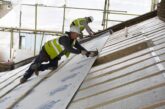
As the move towards cleaner, renewable energy sources continues apace the incentive to develop and implement effective energy sources has never been greater.
Daniel Redfern, Marketing Manager at Marley said: ‘With UK government targets of net zero greenhouse gas emissions by 2050, the forthcoming changes to the Part L building regulation – that covers Conservation of Fuel and Power – will help to positively impact those targets, with solar energy being a key driver.
‘In fact, Solar Energy UK predicts that the Part L changes could lead to five times the number of new homes built with solar technology. In addition, rising fuel prices are encouraging homeowners to retro fit solar PV to their existing roofs to help offset high energy bills and increased electricity usage required for the charging of electric vehicles.
‘These changes will provide a host of opportunities to roofing contractors who upskill their workforce in Solar PV installation, such as becoming MCS certified. Whilst investment will be necessary to ensure that roofing contractors are qualified to fit solar panels, the benefits and ongoing opportunities far outweigh the initial costs.’
MCS certification – the advantages
The Microgeneration Certification Scheme (MCS) covers installations of solar PV systems. Being MCS certified means that you can offer solar services yourself, without being reliant on other contractors.
In addition, residential solar systems in the UK must be MCS accredited in order to be eligible for a Smart Export Guarantee – the new way that homeowners are paid for their power. If they generate more than they require, the surplus will be put on the grid. As well as giving your customers peace of mind, the certification can also help grow your business as people will often search for an MCS certified installer for this important reason – if their system is not MCS certified, they can’t get a Smart Export Guarantee and they can’t sell their surplus energy back to the grid.
In addition, having the capability to offer a full roof system installation, including solar, will boost your business as the need to engage with different contractors is reduced, streamlining the process. To apply, you will need to get the appropriate training for solar PV connection and apply to a certification body to arrange assessment. More information can be found at https://mcscertified.com/installers-manufacturers/becoming-certified/
What does it involve?
There are four separate elements that are required to become MCS certified:
- Quality workmanship
All MCS installers are assessed against the MCS 001 Standard and the specific technical standard for solar, to ensure the system is installed in line with MCS standards.
- Customer care
Belonging to a Trading Standards Institute (TSI) approved consumer code is a must. Apply to the Renewable Energy Consumer Code (RECC) or Home Insulation & Energy Systems Quality Assured Contractors Scheme (HIES).
- Demonstrating competency
Prove the competency of employees via in date qualifications held and/or short courses attended or demonstrating experience to your MCS certification body.
- Quality management system
Demonstrate the operation of a Quality Management System (QMS) – the assessing Certification Body will ensure that the standard requirements are reached through documented procedures and systems.
How much does it cost to become MCS certified?
The application normally costs £595 + VAT for the company – not for each individual. However, as part of Marley’s ‘Supporting the Roofer’ initiative, all roofing businesses can claim a £50 discount on their MCS certification application via a collaboration with NAPIT, in preparation for the Part L changes. For more details visit www.marley.co.uk/mcsapply
For advice and further details on Part L visit www.marley.co.uk







